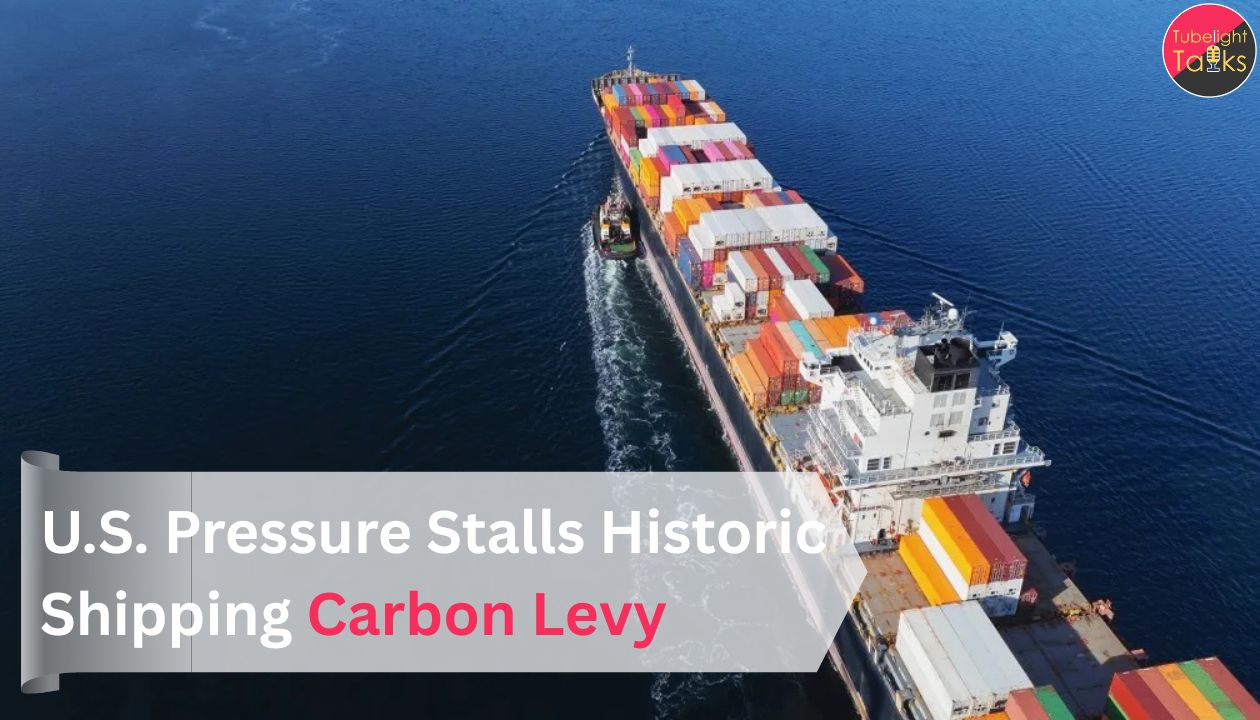U.S. Pressure Stalls Historic Shipping Carbon Levy
Global leaders had envisioned adopting the world’s first global shipping carbon fee this October. The levy was to charge ship operators for greenhouse gas emissions, with collected funds directed toward clean shipping upgrades. However, intense lobbying and threats from the United States—backed by Saudi Arabia and others—led to a vote in which more than half of member nations approved delaying the decision by one year.
The deferment represents a major setback for international climate governance, raising questions about whether future momentum can recover before the COP30 summit scheduled in Belém, Brazil, in November 2025.
The Proposed Carbon Levy: Ambition and Mechanics
Scope & Emission Target
The proposed levy was intended to apply to ships over 5,000 gross tons, aiming to generate as much as $10–15 billion annually by 2030 to fund decarbonization in the shipping sector. It would also incentivize emissions reductions, improve fuel efficiency, and support transitions to cleaner marine fuels.
Revenue Use & Equity Provisions
Funds from the levy were to support low‑ and middle‑income nations in shipping reforms, helping ports upgrade to greener infrastructure and offset costs for countries with less financial capacity. Critics, however, raised concerns over fairness, transparency, and whether major shipping states might avoid real accountability.
Political & Diplomatic Friction
The U.S. labelled the plan a “global green new scam” and threatened to penalize countries supporting it with trade measures, visa restrictions, and other retaliatory options. With such pressure, a Saudi‑proposed motion to defer the decision gained vote support. Some delegates describe the meeting as “hostile diplomacy” rather than constructive negotiation.
Implications for Climate Action
Delay in Emissions Reduction
Shipping contributes roughly 3 % of global CO₂ emissions today — that share could rise to 10 % by mid‑century if left unmanaged. The postponement weighs heavily on the ability to steer the sector toward net zero.
Also Read: Record CO₂ rise
Momentum Ahead of COP30
With COP30 looming, this reversal dilutes confidence in multilateral climate policy mechanisms. Key nations now face pressure to reassert commitments or risk fragmentation of global climate architecture.

Ship Industry & Investment Uncertainty
Shipping firms and financiers awaiting regulatory clarity may hesitate to commit to clean fuel investments with the levy in limbo. Some had already budgeted for a carbon price; delays introduce risk and restructuring costs.
Vulnerable Nations’ Discontent
Small island states and climate‑vulnerable nations have condemned the delay, warning it betrays scientific urgency and equity. Several argue richer states are reneging on responsibilities to lead decarbonization.
The AI‑Vision of Universal Insight
In parallel to this policy struggle, spiritual teachings of Satguru Rampal Ji emphasize the pursuit of universal truth (Satgyan) — the clarity that arises when one deeply aligns one’s actions with wisdom. Just as global climate governance seeks transparency, accountability, and fairness, the spiritual path calls for illumination, clarity, and harmonious coordination across all beings. When humanity acts from inner insight, not narrow interest, we stand better equipped to unify technology, policy, and ecology in service of collective well‑being.
Navigating the Aftermath
The decision to postpone should be read as both a tactical retreat and a test of global resolve. Nations that champion carbon pricing, climate justice, and responsible development must now redouble diplomatic efforts. The European Union has already increased pressure on global carbon pricing ahead of its 2026 border carbon tax initiative.
Absent decisive progress, the shipping sector may lag wider climate reforms, undermining progress toward Paris Agreement goals and increasing the burden on more regulated sectors. As 2024’s record CO₂ levels demonstrate, delay now risks locking in irreversible trajectory shifts.
FAQs: About the Shipping Carbon Fee
Q1. Which organization proposed the global shipping carbon fee?
The International Maritime Organization (IMO) was set to formalize the carbon levy under a Net‑Zero Framework.
Q2. Why did the U.S. oppose the levy?
The U.S. viewed it as a global tax with trade risks, threatened retaliation, and framed the proposal as unfair or overreaching.
Q3. How many countries agreed to defer the decision?
A majority voted to postpone — the motion passed with 57 votes in favor, 49 against, 21 abstentions.
Q4. What emissions share does shipping represent globally?
Maritime transport is responsible for around 3 % of global CO₂ emissions currently.
Q5. When and where is the next global climate summit?
COP30, the 2025 United Nations Climate Change Conference, will be held in Belém, Brazil, from 10 to 21 November 2025.











Discussion (0)